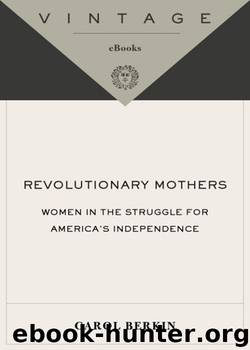Revolutionary Mothers by Carol Berkin

Author:Carol Berkin
Language: eng
Format: epub
Tags: Nonfiction
ISBN: 9780307427496
Publisher: Knopf Doubleday Publishing Group
Published: 2007-12-17T16:00:00+00:00
CHAPTER SIX
“A JOURNEY A CROSSE YE WILDERNESS”
Loyalist Women in Exile
On September 1, 1774, Esther Quincy Sewall looked through her window in horror at the mob gathering outside her Cambridge home. She did not have to ask why these fifty men and boys were there: she knew they wanted her husband, Jonathan. Jonathan was the Massachusetts attorney general and a judge of the Vice Admiralty Courts, a man who had earned a reputation as the king’s staunch defender both in the courts and in the local press. The crowd outside his home meant to make an example of him. But the attorney general was in Boston, Esther explained, and she was alone with her two young sons. Go away, she pleaded. No one moved.
Looking out at so many threatening faces, Esther surely recognized some of them as neighbors, friends, or acquaintances. She had been born and raised in Massachusetts, the daughter of one of the oldest and most notable families of the province, and she had married into another family known throughout New England for its judges, scholars, and lawyers. Until 1774, Esther and Jonathan Sewall had no reason to assume that politics would create an irreparable division among the members of their elite social circle. The ties of class, profession, and family seemed too strong to be broken. Esther’s sister had, after all, married John Hancock, making Boston’s most popular smuggler and the attorney who prosecuted him brothers-in-law, and Jonathan Sewall’s closest friend was fellow lawyer John Adams. But by that fall day in 1774, Esther had learned the lesson that other loyalist women would learn: a crisis of political loyalties had rent the fabric of their social world. Even more disturbing was a second revelation: Esther’s loyalty to her husband, once a private commitment, had become a political act. Esther Quincy had become a loyalist because she had become Mrs. Jonathan Sewall.
As rocks began to shatter the windows of her home, a desperate but resourceful Esther Sewall offered the mob free access to her husband’s wine cellar. After drinking their fill, the men and boys dispersed. But the experience served as a clear warning to the Sewalls that the time had come to choose. John Adams had been correct when he said the die was cast. A year later, the Sewall family was in England, exiles from their native land.1
Over the next decade, other prominent loyalist women would realize, as Esther Sewall had realized, that family prestige and personal ties to leaders of the Revolutionary movement would not necessarily protect them. In Philadelphia, Grace Growden Galloway was to learn this lesson in the hardest of ways. Grace’s husband, Joseph, had been speaker of the assembly and a leading member of the Continental Congress. But when independence was declared, he would not renounce his allegiance to the king. When the British occupied Philadelphia in 1776, Joseph Galloway played a major role in assisting them. Then when the British evacuated the city and American forces prepared to occupy it, he fled to the safety of New York City.
Download
This site does not store any files on its server. We only index and link to content provided by other sites. Please contact the content providers to delete copyright contents if any and email us, we'll remove relevant links or contents immediately.
On the Front Line with the Women Who Fight Back by Stacey Dooley(4319)
The Lonely City by Olivia Laing(4133)
The Rules Do Not Apply by Ariel Levy(3920)
Bluets by Maggie Nelson(3728)
The Confidence Code by Katty Kay(3577)
Three Women by Lisa Taddeo(2927)
A Woman Makes a Plan by Maye Musk(2843)
Inferior by Angela Saini(2842)
Pledged by Alexandra Robbins(2798)
Not a Diet Book by James Smith(2744)
Confessions of a Video Vixen by Karrine Steffans(2685)
Wild Words from Wild Women by Stephens Autumn(2602)
Nice Girls Don't Get the Corner Office by Lois P. Frankel(2602)
Brave by Rose McGowan(2512)
The Girl in the Spider's Web: A Lisbeth Salander novel, continuing Stieg Larsson's Millennium Series by Lagercrantz David(2387)
The Clitoral Truth: The Secret World at Your Fingertips by Rebecca Chalker(2251)
Why I Am Not a Feminist by Jessa Crispin(2248)
Women & Power by Mary Beard(2230)
Women on Top by Nancy Friday(2134)
